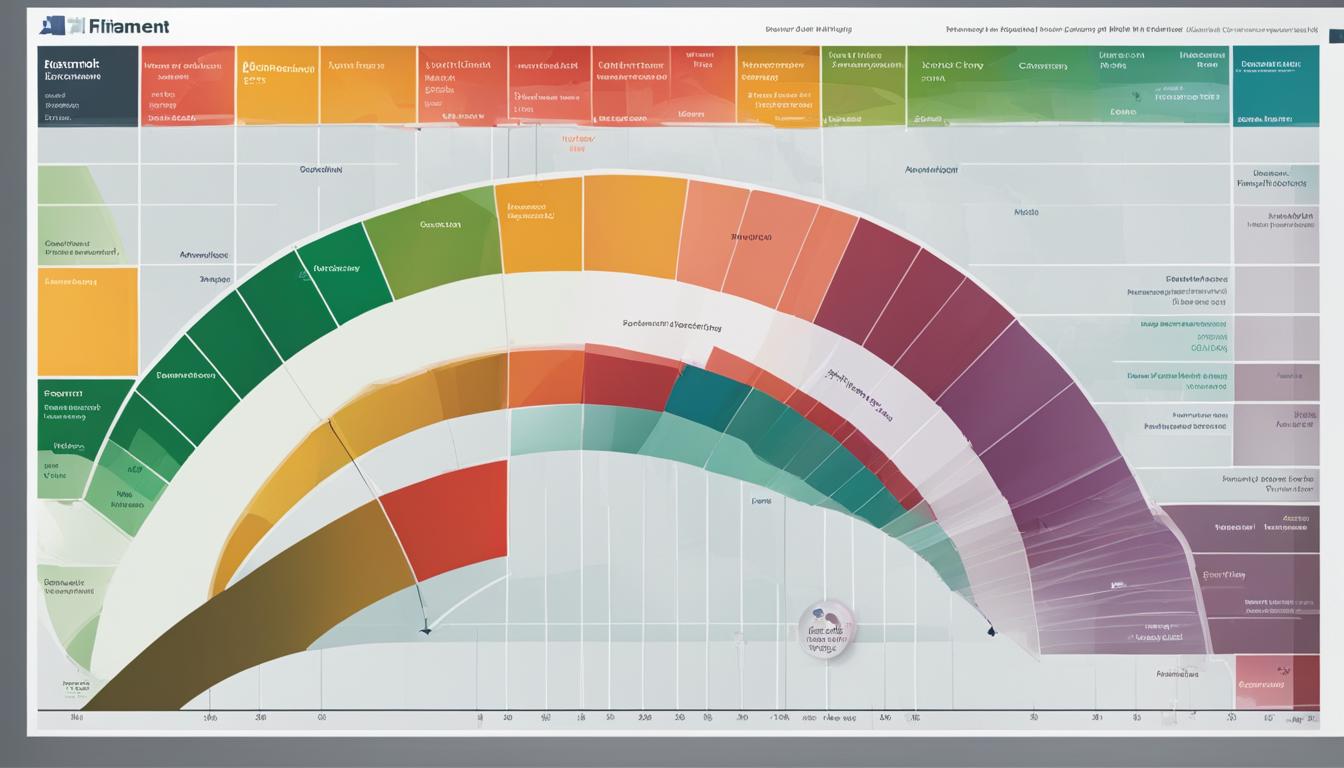Setting financial goals is essential for achieving financial success. It provides a sense of direction, purpose, and motivation. Whether your goal is to save for retirement, pay off debt, or invest in assets, having a clear plan of action is crucial.
Setting specific, measurable, achievable, relevant, and time-bound (SMART) goals helps keep you focused and motivated. Tracking your progress regularly and starting with small, achievable goals can lead to long-term financial success.
Key Takeaways
- Setting financial goals provides direction, purpose, and motivation.
- SMART goals keep you focused and motivated.
- Tracking progress and starting with small goals leads to long-term success.
- Financial goals can include saving for retirement, paying off debt, or investing in assets.
- Clear plans of action are crucial for achieving financial goals.
The Benefits of Financial Goal Setting
Financial goal setting offers numerous advantages. It helps you stay focused and motivated by providing a clear end goal to work towards. Setting goals also brings clarity and direction to your financial decisions, enabling you to prioritize and stay organized. By forcing you to think ahead and anticipate potential problems, goal setting increases your chances of success. Additionally, having measurable goals and tracking your progress allows for adjustments and celebrates milestones along the way.
| Benefits of Financial Goal Setting |
|---|
| 1. Stay Focused and Motivated |
| 2. Clarity and Direction in Financial Decisions |
| 3. Increased Chances of Success |
| 4. Measurable Goals and Progress Tracking |
“Setting goals gives you the foundation to build your financial future. It helps you stay focused on what really matters and achieve the financial success you desire.”
Having financial goals provides a sense of purpose and direction in your financial journey. It gives you something to strive for and helps you make more informed decisions. When you set specific goals, such as saving for a down payment on a house or paying off a certain amount of debt, you create a clear path to follow. This clarity keeps you on track and prevents you from feeling overwhelmed or lost in your financial decisions.
Furthermore, financial goal setting keeps you motivated. It gives you something to aim for and makes your efforts feel purposeful. When you have a goal in mind, you’re more likely to stay disciplined and make the necessary sacrifices to achieve it. Seeing your progress and reaching milestones along the way provides a sense of accomplishment and further boosts your motivation.
By setting measurable goals and tracking your progress, you can make adjustments as needed. This flexibility allows you to adapt to changing circumstances and keep moving forward. You can celebrate small wins along the way, which can further fuel your motivation and determination.
Overall, financial goal setting brings numerous benefits, including clarity and direction in your financial decisions, increased focus and motivation, and the ability to measure and celebrate your progress. By setting goals and consistently working towards them, you can achieve the financial success you desire.
How To Set Effective Financial Goals
When it comes to achieving financial success, effective goal setting is key. By setting clear and measurable financial goals, you can create a roadmap towards your desired outcomes. Let’s explore the three essential elements of effective financial goal setting: specificity, measurability, and deadlines.
Specificity
Specificity means clearly defining what you want to achieve with your financial goals. Instead of setting vague goals like “save money” or “pay off debt,” be more specific. For example, you could set a goal to save $10,000 for a down payment on a house or pay off $5,000 in credit card debt within six months. Specific goals provide a clear direction and serve as a guiding force as you work towards achieving them.
Measurability
Measurability is crucial in determining your progress and success. When setting financial goals, ensure they are measurable. This means including a quantifiable aspect that allows you to track your progress. For instance, if your goal is to save money, specify an exact amount or percentage to save. By measuring your progress along the way, you can identify any adjustments needed and stay focused on your goals.
Deadlines
Setting deadlines for your financial goals creates a sense of urgency and accountability. Deadlines help prevent procrastination and keep you on track towards achieving your goals. When setting deadlines, consider the timeframe that is both realistic and challenging. For instance, if you want to pay off a specific amount of debt, set a deadline that pushes you to make consistent progress while considering your financial capabilities.
“Effective financial goal setting requires three key elements: specificity, measurability, and deadlines.”

By incorporating specificity, measurability, and deadlines into your financial goal setting process, you can increase your chances of success. These elements provide structure and direction, guiding you towards your desired financial outcomes.
Below is a table summarizing the key elements of effective financial goal setting:
| Key Elements | Description |
|---|---|
| Specificity | Clearly define what you want to achieve |
| Measurability | Include a quantifiable aspect to track progress |
| Deadlines | Set realistic and challenging timeframes |
By following these principles of effective financial goal setting, you can ensure your goals are achievable and contribute to your long-term financial success.
Tips for Maintaining Financial Motivation
Maintaining financial motivation can be challenging, but with the right strategies, you can stay on track and achieve your financial goals. Here are some tips to help you maintain your financial motivation:
- Know Your “Why”: Understanding the underlying motivation behind your financial goals is essential for maintaining motivation. Ask yourself why these goals are important to you and how they align with your values and aspirations. This deeper sense of purpose will keep you focused and determined.
- Set S.M.A.R.T. Goals: Setting specific, measurable, achievable, relevant, and time-bound (S.M.A.R.T.) goals can provide clarity and direction. Break down larger goals into smaller checkpoints to make them feel more attainable. This approach allows you to track your progress and celebrate milestones along the way.
- Keep Visual Reminders: Visual reminders of your financial goals can serve as constant motivators. Whether it’s a vision board, sticky notes, or a screensaver, having visual cues that represent your goals can keep them top-of-mind and help you make better financial decisions.
- Celebrate Wins: Acknowledge and celebrate your financial victories, no matter how small they may seem. Rewarding yourself for reaching milestones reinforces positive behaviors and provides a sense of accomplishment. It also boosts your confidence and motivation to keep moving forward.
- Surround Yourself with Encouraging People: Build a support system of like-minded individuals who are also focused on achieving financial success. Surrounding yourself with positive and encouraging people can provide motivation, accountability, and valuable insights. Share your goals with them and lean on their support when you need it.
- Continuously Learn: Commit to lifelong learning and personal development in the realm of finance. Stay updated on financial trends, strategies, and best practices. This knowledge will empower you, boost your confidence, and inspire you to keep growing and improving your financial situation.
- Embrace Setbacks as Learning Opportunities: Financial setbacks are inevitable, but they can also be valuable learning experiences. Instead of becoming discouraged, view setbacks as opportunities for growth and improvement. Learn from your mistakes, adjust your strategy if necessary, and keep moving forward.
- Keep Moving Forward: Remember that maintaining financial motivation is an ongoing process. Stay committed to your goals, embrace the journey, and keep looking ahead. Even small steps taken consistently can lead to significant progress over time.
By implementing these strategies, you can maintain your financial motivation and stay focused on achieving your goals.

Reflecting on Intentions: Steps to Set Financial Goals
Setting financial goals requires a thoughtful and deliberate approach. By reflecting on your intentions and following a series of steps, you can effectively set financial goals that align with your aspirations and lead you towards financial success.
List Out Your Goals
Begin by listing out your goals, both current and future. Take the time to think about what you want to achieve in the short-term and the long-term. Whether it’s buying a house, starting a business, or retiring comfortably, having a clear picture of your goals is essential. This exercise helps you gain clarity and envision the financial future you desire.
Prioritize Your Goals
Once you have your goals listed, prioritize them based on importance. Consider the time sensitivity and potential impact of each goal. This step helps you determine where to focus your resources and energy. Prioritizing your goals ensures that you make progress towards the ones that matter most to you.
Establish the Basics
As you set financial goals, it’s important to establish a solid foundation. This includes building an emergency fund, paying off debt, and saving for retirement. These fundamental steps lay the groundwork for your long-term financial stability and enable you to pursue your larger goals with confidence.
Understand Your Motivations
Understanding the motivations behind your financial goals is crucial for maintaining commitment and drive. Take the time to reflect on why each goal is important to you. Whether it’s providing for your family, achieving personal fulfillment, or creating a life of financial freedom, knowing your motivations adds meaning and purpose to your financial journey.
Create a Comprehensive Financial Plan
Finally, create a comprehensive financial plan that aligns with your goals. Start by assessing your current financial situation, including your income, expenses, and assets. This evaluation helps you identify any gaps or areas for improvement. Next, develop a budget that reflects your goals and allows you to allocate resources accordingly. A well-crafted financial plan provides a roadmap to success and ensures that you stay on track towards achieving your goals.
By reflecting on your intentions, listing out your goals, prioritizing them, establishing the basics, understanding your motivations, and creating a comprehensive financial plan, you can set yourself up for financial success. Remember, setting goals is just the beginning. It’s the actions you take and the commitment you maintain that will ultimately determine your financial outcomes.

| Steps to Set Financial Goals | Summary |
|---|---|
| 1. List out your goals | Gaining clarity and envisioning your financial future |
| 2. Prioritize your goals | Focusing resources and energy on the most important goals |
| 3. Establish the basics | Building a solid foundation for long-term financial stability |
| 4. Understand your motivations | Adding meaning and commitment to your financial journey |
| 5. Create a comprehensive financial plan | Developing a roadmap for success and staying on track |
The Role of Priorities and Goal Alignment
Prioritizing your goals and aligning them with your priorities is crucial for effective goal setting. By understanding what’s most important to you and how your goals align with your timeline and priorities, you can make informed decisions and stay on track towards achieving your financial objectives.
When setting financial goals, it’s essential to consider both short-term and long-term objectives. Short-term goals provide immediate benefits and satisfaction, while long-term goals contribute to your overall financial stability and security. Saving for multiple goals simultaneously allows you to address different financial needs and aspirations, ensuring a balanced approach to wealth management.
Aligning Priorities with Goals
Understanding your priorities helps you determine which goals to tackle first. To align your priorities and goals effectively, consider the following steps:
- Identify your core values: Reflect on what truly matters to you in life, whether it’s family, personal growth, financial freedom, or other aspirations. These core values will guide your decision-making process and help you align your goals accordingly.
- Evaluate your timeline: Determine the time horizon for each goal, whether it’s short-term, medium-term, or long-term. Having a clear understanding of your timeline allows you to allocate resources and make appropriate financial decisions.
- Establish the urgency: Prioritize goals that require immediate attention or have time-sensitive deadlines. By addressing urgent goals first, you can reduce stress and focus on achieving them efficiently.
- Consider financial feasibility: Assess the financial viability of each goal and prioritize based on your current income, expenses, and savings capacity. It’s important to set realistic goals that you can reasonably achieve.
By following these steps and aligning your priorities with your goals, you can create a structured plan that sets you up for success.
The Benefits of Aligning Priorities
Aligning your priorities and goals offers several advantages, including:
- Focus and clarity: When your goals align with your priorities, you gain a clear sense of direction and purpose. This focus helps you stay motivated and make better financial decisions along the way.
- Efficiency and effectiveness: By prioritizing your goals, you can allocate your time, energy, and resources more efficiently, ensuring that you make progress towards your objectives.
- Reduced stress and overwhelm: Aligning priorities allows you to approach your financial journey with a sense of balance and peace of mind. You can avoid feeling overwhelmed by focusing on what truly matters to you.
- Improved decision-making: When your goals align with your priorities, it becomes easier to make decisions that support your long-term vision and bring you closer to financial success.
An Example of Aligning Priorities and Goals
Let’s consider an example to illustrate the process of aligning priorities and goals:
Sarah’s top priority is building a secure financial future for herself and her family. She has identified three goals:
- Save for a down payment on a house within the next three years.
- Invest in her retirement fund to ensure a comfortable retirement.
- Set up an emergency fund to cover unexpected expenses.
Based on her priorities, Sarah decides to allocate her resources as follows:
Goal Priority Emergency Fund High Retirement Fund Medium House Down Payment Low By aligning her goals with her priorities, Sarah can focus on building her emergency fund first, ensuring financial stability. She can then allocate resources to her retirement fund and, finally, save for a down payment on a house.
By aligning priorities and goals, you can make intentional choices that support your long-term financial well-being. Understanding what’s most important to you and how your goals fit into your overall priorities empowers you to make informed decisions and stay committed to your financial journey.
Reviewing and Evolving your Financial Goals
Setting financial goals is an important step towards achieving long-term financial success. However, it is equally crucial to regularly review and evolve your goals to ensure they remain relevant and aligned with your changing circumstances. Life events, economic fluctuations, and personal growth can impact your financial goals, so it’s essential to adjust your expectations and priorities accordingly.
By periodically revisiting your financial goals, you can assess whether they are still meaningful and realistic. This enables you to make necessary adjustments and stay confident in your financial plan. At a minimum, it is recommended to review your goals once a year, although you may choose to do so more frequently if significant changes occur in your life.
During the review process, consider whether your goals are still aligned with your values, aspirations, and current financial situation. Ask yourself if any unexpected circumstances have arisen that might require you to modify or postpone certain goals. Reflecting on your motivations and reassessing your priorities can help you make informed decisions about which goals to continue pursuing and which ones may need to be adjusted or replaced.
Moreover, be open to adjusting your expectations. While it’s important to set ambitious goals, they should also be realistic and attainable. Revising your expectations can help you stay motivated and prevent frustration or burnout along the way. It’s better to set smaller, achievable milestones that contribute to your long-term objectives than to set overly lofty goals that may become overwhelming or demotivating.
Regularly reviewing your goals also allows you to track your progress and celebrate milestones along the way. Acknowledging and appreciating your accomplishments can boost your motivation and reinforce your commitment to the financial journey. It serves as a reminder of the progress you’ve made and the positive impact your efforts have had on your financial well-being.
“The only way to do great work is to love what you do. If you haven’t found it yet, keep looking. Don’t settle.” – Steve Jobs
By continuously reviewing and evolving your financial goals, you demonstrate adaptability and a commitment to your financial success. It allows you to stay proactive and make necessary adjustments when circumstances change. Your financial journey is a dynamic process, and by staying engaged with your goals, you empower yourself to make informed decisions and stay motivated along the way.
| Key Steps in Reviewing and Evolving Financial Goals |
|---|
| 1. Reflect on your motivations |
| 2. Reassess your priorities |
| 3. Evaluate goal alignment with values and current financial situation |
| 4. Adjust expectations to ensure they are realistic and attainable |
| 5. Celebrate milestones and track progress |
Conclusion
Financial goals are the cornerstone of achieving long-term financial success. By setting clear and specific goals, you create a roadmap that guides your actions and keeps you motivated on your financial journey. Understanding the benefits of financial goal setting, such as staying focused and having clarity and direction, empowers you to make informed decisions and prioritize your resources effectively.
Following effective goal-setting techniques, such as setting SMART goals that are specific, measurable, achievable, relevant, and time-bound, enhances the likelihood of achieving your financial objectives. Breaking down larger goals into smaller milestones allows for a sense of progress and accomplishment, keeping you motivated along the way.
Regularly reviewing and evolving your financial goals is crucial to ensure they remain aligned with your changing circumstances and aspirations. By adjusting expectations and reviewing priorities, you can adapt your goals to reflect your evolving financial situation and stay on track towards success.
Remember, financial goal setting is not a one-time activity but an ongoing process. By staying motivated, following effective strategies, and regularly reviewing and evolving your goals, you can unlock the power of financial goals to achieve the financial success you desire.
How Do Financial Goals Impact Motivation and Future Planning?
Understanding the psychology of money goals is crucial for motivation and future planning. Setting financial goals can drive individuals to work harder and save more, ultimately leading to a sense of accomplishment. By visualizing the future impact of their actions, people are more likely to stay focused and committed to their financial objectives.
FAQ
Why are financial goals important?
Financial goals provide direction, purpose, and motivation. They help you prioritize and make informed decisions, increasing your chances of success in achieving financial stability and success.
What are the benefits of setting financial goals?
Setting financial goals brings clarity and direction to your financial decisions, helps you stay focused and organized, and increases your chances of success by forcing you to think ahead and anticipate potential problems. Measurable goals and tracking progress allow for adjustments and celebrate milestones along the way.
How can I set effective financial goals?
To set effective financial goals, be specific about what you want to achieve, break down larger goals into smaller, measurable ones, and attach deadlines to create a sense of urgency. Having a strong desire and commitment to your goals is also crucial.
How can I maintain financial motivation?
To maintain financial motivation, know your “why” and identify the underlying motivation behind your goals. Set S.M.A.R.T. goals, break down larger goals into smaller checkpoints, keep visual reminders, celebrate wins, surround yourself with supportive people, continuously learn, and embrace setbacks as learning opportunities.
What are the steps to setting financial goals?
Start by listing out your goals, prioritizing them based on importance. Establish the basics, such as building an emergency fund, paying off debt, and saving for retirement. Understand the underlying motivations behind your goals. Finally, create a comprehensive financial plan that aligns with your goals, assessing your current financial situation and budgeting.
How do I prioritize my financial goals?
Prioritize your goals by aligning them with your priorities and determining which goals are most important to you. You can save for multiple goals simultaneously, including both short-term and long-term goals, based on your timeline and priorities.
How often should I review and evolve my financial goals?
It is recommended to review your financial goals at least once a year to ensure they remain relevant and aligned with your changing circumstances. Life events and other factors can impact your goals, so adjusting expectations and priorities accordingly is essential.
What is the role of financial goals in achieving success?
Financial goals play a crucial role in achieving long-term financial success. By setting clear, specific goals, maintaining motivation, and regularly reviewing and evolving your goals, you can unlock the power of financial goals to drive success and achieve your desired financial outcomes.
Source Links
- https://www.forbes.com/sites/melissahouston/2023/02/22/setting-financial-goals-and-achieving-them/
- https://students.1fbusa.com/money-smarts/tips-to-stay-motivated-on-your-financial-journey
- https://www.usbank.com/wealth-management/financial-perspectives/financial-planning/how-to-set-financial-goals.html




